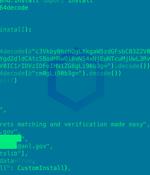Security News

A new stealthy Linux malware known as Shikitega has been discovered infecting computers and IoT devices with additional payloads. The malware exploits vulnerabilities to elevate its privileges, adds persistence on the host via crontab, and eventually launches a cryptocurrency miner on infected devices.

Trend Micro predicted that ransomware groups will increasingly target Linux servers and embedded systems over the coming years. Jon Clay, VP of threat intelligence for Trend Micro, said: "New and emerging threat groups continue to evolve their business model, focusing their attacks with even greater precision. That's why it's essential that organizations get better at mapping, understanding, and protecting their expanding digital attack surface. A single, unified cybersecurity platform is the best place to start."

Chile's national computer security and incident response team has announced that a ransomware attack has impacted operations and online services of a government agency in the country. The attack started on Thursday, August 25, targeting Microsoft and VMware ESXi servers operated by the agency.

Details of an eight-year-old security vulnerability in the Linux kernel have emerged that the researchers say is "As nasty as Dirty Pipe.". "DirtyCred is a kernel exploitation concept that swaps unprivileged kernel credentials with privileged ones to escalate privilege," researchers Zhenpeng Lin, Yuhang Wu, and Xinyu Xing noted.

More than 200 malicious packages have been discovered infiltrating the PyPI and npm open source registries this week. These packages are largely typosquats of widely used libraries and each one of them downloads a Bash script on Linux systems that run cryptominers.

A now-removed rogue package pushed to the official third-party software repository for Python has been found to deploy cryptominers on Linux systems. The module, named "Secretslib" and downloaded 93 times prior to its deletion, was released to the Python Package Index on August 6, 2022 and is described as "Secrets matching and verification made easy."

Kali Linux 2022.3 released: Packages for test labs, new tools, and a community Discord serverOffensive Security has released Kali Linux 2022.3, the latest version of its popular penetration testing and digital forensics platform. Cisco has been hacked by a ransomware gangU.S. networking giant Cisco Systems has been hacked, the company confirmed on Wednesday, after Yanluowang ransomware operators claimed the attack on their leak site.

A pair of reports from cybersecurity firms SEKOIA and Trend Micro sheds light on a new campaign undertaken by a Chinese threat actor named Lucky Mouse that involves leveraging a trojanized version of a cross-platform messaging app to backdoor systems. Infection chains leverage a chat application called MiMi, with its installer files compromised to download and install HyperBro samples for the Windows operating system and rshell artifacts for Linux and macOS. As many as 13 different entities located in Taiwan and the Philippines have been at the receiving end of the attacks, eight of whom have been hit with rshell.

Versions of a cross-platform instant messenger application focused on the Chinese market known as 'MiMi' have been trojanized to deliver a new backdoor that can be used to steal data from Linux and macOS systems. SEKOIA's Threat & Detection Research Team says that the app's macOS 2.3.0 version has been backdoored for almost four months, since May 26, 2022.

The U.S. Cybersecurity and Infrastructure Security Agency on Tuesday added a recently disclosed security flaw in the UnRAR utility to its Known Exploited Vulnerabilities Catalog, based on evidence of active exploitation. Tracked as CVE-2022-30333, the issue concerns a path traversal vulnerability in the Unix versions of UnRAR that can be triggered upon extracting a maliciously crafted RAR archive.